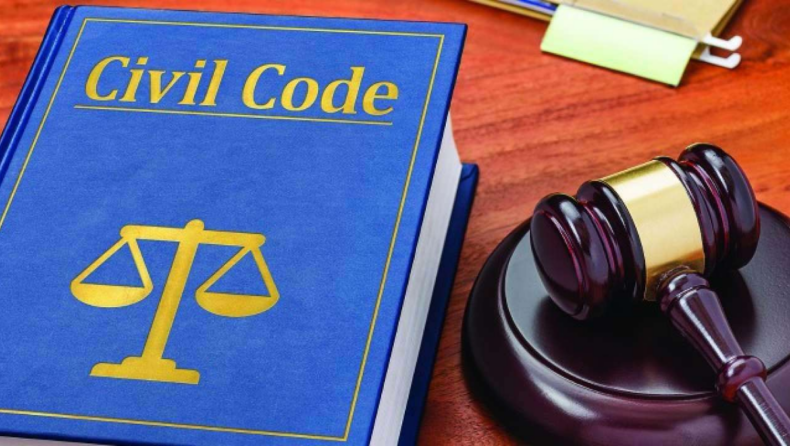Government`s stance on Uniform Civil Code, Over the last eight years, from one administration to the next, the government’s stance on the Uniform Civil Code (UCC) has undergone significant change. The Ministry of Law and Justice’s most current position is claimed to have been communicated to a parliamentary committee.
According to the Ministry of Law and Justice, personal laws can be reviewed when a “sizeable majority” of the populace requests their revision or new legislation is passed. This is similar to Goa, where a 155-year-old Portuguese-era law is still in force. 
Since 1991, the government’s written responses to Parliament indicate a change in position. The “constant policy” of prior administrations was to “not intervene with the personal laws of the minority population”.
“No intervene,” 1991-04:
In response to a query from Ashok Deshmukh from Shiv Sena on July 19, 1991.
The late P R Kumaramangalam of the Congress, said: “Minority community’s laws will unavoidably change as a result of the adoption of the Uniform Civil Code for all residents”.
The government has consistently taken the position that it should not intervene in the privacy laws of minority communities unless those communities take the initiative to change them.
The NDA administration under Atal Bihari Vajpayee adopted the same position. In response to a question from Yogi Adityanath of the BJP in the Lok Sabha on August 17, 2000.
The late Arun Jaitley, who was serving as the country’s law minister at the time, stated “The Central Government’s stance has always been to refrain from meddling in the personal laws of the minority communities unless the necessary initiative comes from the affected communities themselves,”
On November 29, 2001, Jaitley responded to a question from Brijlal khabri (BSP) by saying, the government has a policy of refusing to change these rules unless those communities take the initiative.
The UPA years:
This was upheld by the Manmohan Singh-led UPA government, which also took the additional stance that requests for changes to the personal laws of minority populations should originate from “a large cross-section” of those communities.
According to K. Venkatapathy, Minister of State, in response to a query from Chandrakant Bhaurao Khaire of the Shiv Sena on July 7, 2004. The Central Government has consistently held the position that it will not interfere with the personal laws of minority communities until a significant portion of the community itself takes the appropriate efforts.
This was reaffirmed by Law Minister H R Bhardwaj on 7/4/06, in response to a query from Shiv Sena’s Mohan Rawal. Additionally, MoS Venkatapathy restated the “constant policy of not to intervene” with the private matters of the minority group on August 24, 2007, in response to a query from Adityanath.
During UPA-2 (2009-2014), Radha Mohan Singh and Murli Manohar Joshi of the BJP brought up the issue of UCC on April 29, 2010. (March 10, 2011).
Law Minister Veerappa Moily responded in writing to both inquiries, stating that it is the government’s “constant policy” “not to interfere” in the personal laws of minority populations until “a large cross-section of such communities” take the appropriate measures for such changes.
Queries raised by NDA: Government`s stance on Uniform Civil Code
Members of the first Narendra Modi-led NDA administration (2014–2019) raised inquiries about the UCC at least 13 times, as opposed to just twice in the 13th Lok Sabha, three times in the 14th, and twice in the 15th.
When Adityanath questioned the government on July 14, 2014, about whether it planned to adopt UCC, law minister Ravi Shankar Prasad responded, “The provision of UCC is there in Article 44 of the Constitution. To take further action in this area, extensive stakeholder consultation would be needed.”
On December 3, 2015, Gowda responded to a concern voiced by five BJP and Congress members—Ranjeet Ranjan, Arjun Meghwal, Dr. Sashi Tharoor, Nana Patole, and Dr. Manoj Rajoria—by reiterating the need for “wider consultation.” The Minister claimed that several groups have made requests for the government to implement a UCC as described in Article 44.
The need for an “in-depth assessment of the provisions of various personal laws governing distinct communities” was also emphasized on July 28, 2016, by Minister of State P Chaudhary. He was responding to a query posed by Dr. Thokchom Meinya, Chandu Lal Sahu, C N Jayadevan, Jayadev Galla, and Ch Malla Reddy, among five other members.
Chaudhary emphasized the necessity for an “in-depth study” four times in subsequent replies, on March 15 and March 29, 2017, and on March 28 and April 4, 2018.
On July 22, Rijiju responded in the Lok Sabha to Janardan Singh Sigriwal (of the BJP) and Adoor Prakash (of the Congress), stating: “There are several writ petitions pending before the Hon’ble Supreme court… about UCC. Since the case is still pending, no decision has yet been made regarding UCC implementation in the nation.













